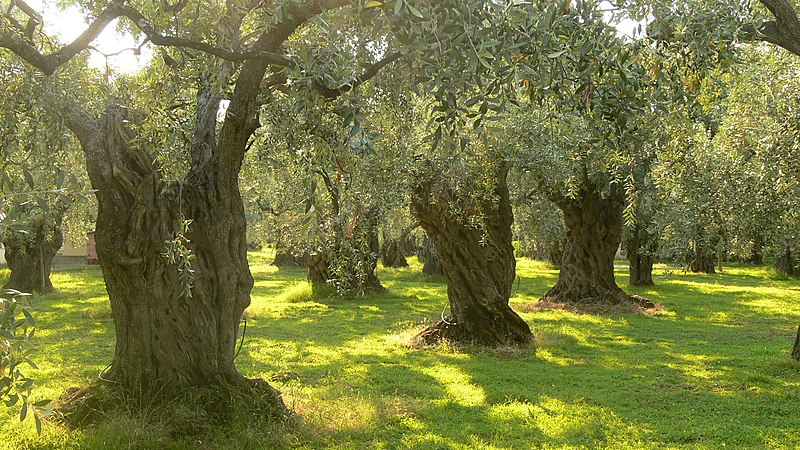There's something serious about olive-trees. Gnarled, ironhard, producing grey-green leaves and succulent salty fruits often for centuries on end, they are frankly a bit special. Nowadays there is a connoisseur trade in ancient olive-trees, symbols of a timeless rustic lifestyle, old masters with bark on them.
In Greece olive oil was essential as a staple crop for local consumption and export, as it still is, and in Athens the trees were under regular inspection. Amongst them the sacred olive-trees were especially precious, as the un-named defendant of a lawsuit in around 395BC knew well. Scattered across the farms of Attica, some of them little more than stumps with fences around them, these trees were thought to descend from one presented to the infant city by Athene herself and were protected by religious law.
We know of the case, though not its outcome, from the speech written for the defendant by the professional speechwriter Lysias. The piece of land in dispute had once been confiscated from a discredited oligarch and since then resold to the defendant, who had proceded to rent it out to a series of tenants. The accusation had been made, for reasons unknown, that he had uprooted and removed a sacred olive stump from his land. This could have resulted in his exile and the confiscation of his property by the state, so the man's defence was robust.
The speech touches on several aspects of Athenian society. First the defendant denies that there had ever been this olive-stump on his land in the first place, then blames the Peloponnesian War, in which the Spartan army had devastated olive-trees, which take a generation to grow large enough to bear fruit, as a scorched-earth tactic. Why, he went on, should he do anything so stupid as to destroy a sacred object in broad daylight, when anyone could report him? Even if he had managed to keep it secret, his own slaves could have blackmailed him for ever after. In any case, there were no other olives on that piece of land and its absence would have been obvious for all to see. He has offered those same slaves for torture - a common tactic implying an absence of anything to hide - but his generous offer was spurned by his accuser, who dismissed slave evidence as unreliable.
The details go on, but the speaker ends with a familiar appeal. Since Athenian law concentrated not purely on the case but on the characters of the plaintiff and defendant, he plays up his services to the city - financing a trireme for the navy, supplying funds for a play at one of the dramatic festivals (themselves semi-religious affairs) - and piles on the sack-cloth and ashes. How unfortunate I would be, he says, driven into exile, torn from my children, leaving my mother destitute and my house deserted!
All about a tree-stump. But in the Athenian context it was a matter of enormous importance, bringing together religious belief, social and political jealousy, the master-slave relationship, past history, civic identity and the love of going to law. Being rich enough to equip a warship meant that this defendant was also rich enough to hire Lysias, but he had to deliver every word of the speech himself. On the Hill of Ares, before the King-Arkhon and jurors, with the prospect of exile in front of him, this unknown man was on his own.
It's in this context that I wrote A Pig in the Roses, which includes a trial held in this court - full details are at http://peteralanorchard.net/, along with my children's story The House in Athene Street, my short story collection Voices in the Past and the latest Anglo-Saxon story, Starlight.
STOP PRESS: A Pig in the Roses is a miserly $1.99 this week at Smashwords if you use coupon ST73U (offer ends on June 3).
Peter
http://www.peteralanorchard.net/
http://twitter.com/peteraorchard

No comments:
Post a Comment